#queer planetary system
Text
Lesbian, Asexual, Aromantic, Oriented Aroace, Nonbinary








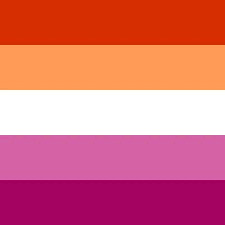



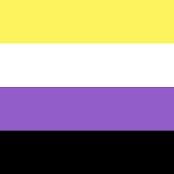
#lesbian#asexual#aromantic#oriented aroace#nonbinary#pride flag planets#queer planetary system#subtle pride#wlw#sapphic#ace#aspec#aro#arospec#aroace#asexual aromantic#aromantic asexual#non binary#enby#trans#lgbtq#queer#pride flag#lgbtq+#pride#lgbt
43 notes
·
View notes
Text

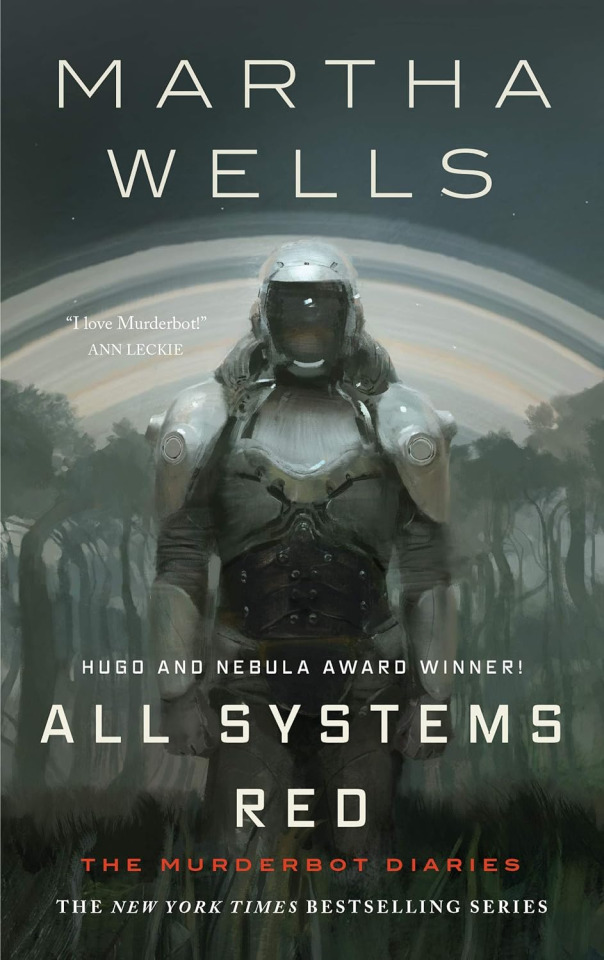
Scum Villain Self Saving System Summary:
Half-demon Luo Binghe rose from humble beginnings and a tortured past to become unrivaled in strength and beauty. With his dominion over both the Human and Demon Realms and his hundreds-strong harem, he is truly the most powerful protagonist...in a trashy webnovel series!
At least, that's what Shen Yuan believes as he finishes reading the final chapter in Proud Immortal Demon Way. But when a bout of rage leads to his sudden death, Shen Yuan is reborn into the world of the novel in the body of Shen Qingqiu--the beautiful but cruel teacher of a young Luo Binghe. While Shen Qingqiu may have the incredible power of a cultivator, he is destined to be horrifically punished for crimes against the protagonist.
The new Shen Qingqiu now has only one course of action: get into Luo Binghe's good graces before the young man's rise to power or suffer the awful fate of a true scum villain!
The Murderbot Diaries Summary:
In a corporate-dominated space-faring future, planetary missions must be approved and supplied by the Company. For their own safety, exploratory teams are accompanied by Company-supplied security androids. But in a society where contracts are awarded to the lowest bidder, safety isn’t a primary concern. On a distant planet, a team of scientists is conducting surface tests, shadowed by their Company-supplied ‘droid--a self-aware SecUnit that has hacked its own governor module and refers to itself (though never out loud) as “Murderbot.” Scornful of humans, Murderbot wants is to be left alone long enough to figure out who it is, but when a neighboring mission goes dark, it's up to the scientists and Murderbot to get to the truth.
#scum villian self saving system#scum villain#svsss#mo xiang tong xiu#mxtx#the murderbot diaries#murderbot#martha wells#danmei#lgbt books#lgbt literature#queer books#queer literature#lgbtqia#poll#bookblr#booklr#books#literature#queer lit
28 notes
·
View notes
Text
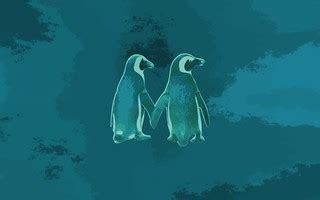
Chapter 3--Penguin Family Values: the nature of planetary environmental reproductive justice by Noel Sturgeon
Sturgeon’s article opens in a discussion of the award-winning nature documentary The March of the Penguins and how the animal was simultaneously adopted by “right-wing fundamentalist Christians in the United States as an inspiring example of monogamy, traditional Christian family values, and intelligent design” & was becoming “a symbol of the naturalness of gay marriage” to others(102)—Tango Makes Three (a children’s book based on ‘gay’ penguins at the Central Park Zoo who raised an egg—naturalness and success of gay marriage for raising children). “Queer families turn out to be just the same as straight families. […] they’re determined by nature” 117
Another example of penguins and reproduction in media—Happy Feet—singing/dancing and themes of normalcy. Homosociality and references of homosexuality but “always flavored with the kind of liberal tolerance covering over ultimate rejection that is thin veneer for heterosexist anxiety”. And ultimately, the main character’s differences are settled when he ends up ‘happily ever after’ in a heterosexual and successfully reproductive nuclear family.
“Penguins (along with polar bears) became popular symbols of what we would lose to global warming. Relatively invisible in the public cultural arena in contrast, were the growing and unequal effects of the pollution of our atmosphere on marginalized human beings such as indigenous peoples in the Arctic regions, who are struggling to preserve their cultures and societies in the face of rapid climate change” (102).
The author uses the term “Environmental Reproductive Justice” as a way of connecting environmental issues with social justice issues. This builds off insights by feminists of color and Global South feminists who tend to argue for the term ‘reproductive justice’ over ‘reproductive rights’—not just the ability to control pregnancy but also the need for childcare, health care, prenatal care, freedom from coerced sterilization, healthy environments, clean air, food and water, adequate housing, etc (103)
Living environmentalism-reproduction as necessarily about the intertwined reproduction of the environment, communities, and individuals (Giovanna Di Chiro, 2008)
How we reproduce—whether we are reproducing people, families, cultures, societies, and/or the planet—is politicized in several layered and contradictory ways (103). Gender and sexuality are often ignored as part of explanations when examining contemporary political and economic systems. I.e. when exploring the contradictions inherent in the right-wing—“far right conservatives have been able to mobilize low-income people on their side even though the political and economic policies working-class people are asked to support are contrary to their own class interests” (frank 2004)—gender roles and reproductive labor are not oft explored as ways they've been able to inspire feelings of fear, anger, oppression=abortion, ‘vulgarity’ in popular culture, homosexuality (I would also add transsexuality/transgenderism now), family values…all centered around gender expectations, driven by changes in economic practices in a globalizing economy (104)
“The politics of gender are often both the politics of reproductions and the politics of production—the intertwined ways that people produce more people, manage bringing up children, figure out how to do the work at home at the same time as the work that brings in a paycheck, decide how and where to buy food, clothing, shelter, and transportation, take care of elders, and create and maintain all of the social institutions that surround this work. And all of this is central to whether or not our ways of living cause environmental degradation.” (104)

“Heterosexual culture achieves much of its metacultural intelligibility through the ideologies and institutions of intimacy…First, its conventional spaces presuppose a structural differentiation of ‘personal life’ from work, politics, and the public sphere. Second, the normativity of heterosexual culture links intimacy only to the institutions of personal life, making them the privileged institutions of social reproduction, the accumulation and transfer of capital, and self-development…intimate life is the endlessly cited elsewhere of political public discourse, a promised haven that distracts citizens from the unequal conditions of their political and economic lives, consoles them for the damaged humanity of mass society, and shames them for any divergence between their lives and the imitate sphere that is alleged to be simple personhood” (Berlant and Warner, 1998 553) (105)
Heterosexist arguments are binary (homosexuality vs heterosexuality, ‘opposites attract’, ‘men are from Mars, women are from Venus’) and normative (heterosexuality is better, more natural, more moral, more normal, more wholesome, better for parenting). So social institutions are structured in a way that privileges heterosexual sexual practices and solidifies what a family should look like; who does the domestic work; how women/men should act, look, behave; how life should be maintained (producing heterosexuality) (105) These heterosexist arguments are usually about preserving and reproducing particular forms of family, social power, and economic practice.
Pro-life/pro-family—not just about preventing abortions, but about the reproduction of a certain historically and culturally specific idealized family form; father is authority; mother is helpmate and childcare provider; several children living in a framework of Christian, religious, patriarchal, heterosexual, nationalistic, U.S. and nuclear—right-wing. “The family acts as a miniature welfare state, modulating consumption, curbing excess desires, improvising child care and providing social security—[…]it is the dreamworld conveyed in the…’serious’ media…where the conservative variant of the neoliberal utopia is attributed to the biologically fixed ‘nature’ of desire (Lancaster 2003, 336) (106)
Fear of allowing women (especially young women, especially women of color, especially poor women—ESPECIALLY young, poor, women of color) have access to choices and support for their own reproductive decisions and thus forming families that do not adhere to the right-wing model…..divinely created=natural, normal so all else is unnatural and opposite of divine

This particular family model especially when located in a suburban, consumer economy dependent on extremes of global inequality, might be an important origin of our present environmental problems. (107)
Nuclear family model relies on women’s unpaid domestic labor (childcare, eldercare), using nonrenewable fuel-intensive transportation such as cars and long-distance shipping of consumer products, women as shoppers/consumers—these stores are part of globalized production and distribution chains dependent on exploitation of the labor of the poor (global south and often women) (107)
Environmental health is centrally important to reproduction as well as production (107) Reproduction is a materialist and a planetary issue—all reproduction comes with consequences for the global environment, economies and social practices.
Planetary reproduction and environmental reproductive justice
Deconstructing Polar Opposites: Endangered Peoples, Endangered Cultures, Endangered Natures
Missing from the conversation is the immediate threat to numerous groups of people especially vulnerable to climate change by reason of geography, poverty, or political discrimination (documentaries that use images of penguins and polar bears to dramatize the consequences of melting polar ice fail to mention the impact on Arctic Indigenous peoples…)
Indigenous people are not penguins, endangered tribal cultures are not endangered species—racist and the parallel trope of the ‘disappearing Indian’ discounts and obscures the struggle of real indigenous peoples to exist and successfully transform their cultures strategically for survival. Arctic indigenous tribes may be threatened by climate change but they are resilient and experienced in resisting threats to their people… (119)
“We’ve adapted in the past, which is why we are still here” (Chickaloon Grand Chief Gary Harrison, 2005)
Arctic Indigenous peoples have been addressing the problem and suggesting solutions for many years because they knew the threats they faced were early warnings for the people around the world.
“All of this will have a profound impact on the viability of indigenous cultures throughout the North and further afield. Everything is connected in nature; what happens in Alaska will affect all other places of the world as a cascading effect, as scientists call it, will occur” (Cochran 2007) (120)
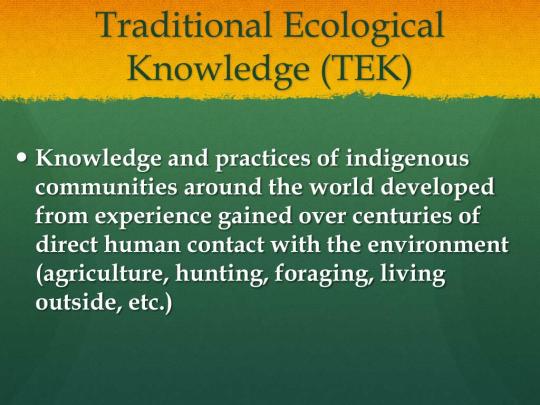
The possibility of losing indigenous knowledge along with the animals and ice….Subsistence living is part of cultural survival and an important method for keeping the world in balance (Harry Bower Jr. 121) The environment is part of a larger universe with moral and cultural aspects that are maintained by the practices of indigenous peoples who have lived on the land for thousands of years (121)
The expansive knowledge [indigenous people have] about sustainable practices, whether it was supported by scientific expertise or traditional experience, was knowledge that arose from a particular way of life, one that needed to be respected and maintained. It was not knowledge gained from the mystical identity of being Ecological Indians, but was rather sophisticated information needed now by all those, Indigenous or not, trying to understand and address climate change (121)
The reproduction of industrialized economic systems, particularly by the United States and other Western countries, has consequences for planetary ecological workings on a global scale as well as on the scale of communities, families, and species, determining the ability of animals, families and cultures to reproduce in healthy and sustainable ways (122)
Too Many People, Too Few Penguins

The concept of over-reproduction and over population are inherently problematic. Human reproduction (especially that of the poor, immigrants, and people in the Global South), is depicted as a major environmental problem…some environmentalists argue against having children at all.
The “Other” population is portrayed as the central problem environmentally and socially whereas “Our” society (developed industrialized societies) are made invisible.
We encourage ‘other’ societies to engage in family planning, education for women, birth control access among other things while ignoring how the US often prioritizes abstinence only programs rather than birth control for their own population, among failing to provide support for women when they do become pregnant (this article was written prior to roe v wade being overturned. But I bet that would be in this article now…)
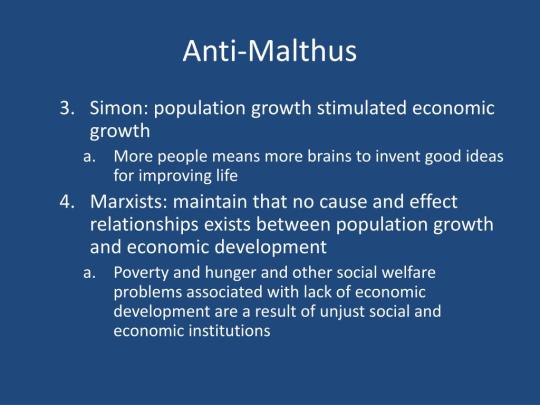
“When environmentalists sound warnings about overpopulation, they are usually expressing fears over the reproduction of (poor) nonwhite people, not of white people, whose populations in all Western countries are in decline (but whose consumption habits generally are not). Calls for educational fixes to inform ‘populations’ about why they should want to bear fewer children advance an imperialist cultural agenda that demands that nonwhite people adopt the cultural, social, and economic practices and systems of organization dominant in Western countries (e.g. the prototypical nuclear family), while blaming the ‘foolishness’ of Third World men and women (since the solution is Western education) for environmental degradation. (Gosine 2005, 80-81) (126)
Environmental Justice Family Values

“We are not outside the earth looking down upon it. Instead, we are inside specific biosystems and complex relationships with other biological entities; we impact and are impacted by the interrelationships of those entities. Responsibility to these ecological niches, networks and dynamics can be brought into view only if we understand ourselves as animals among other animals, with varied sexualities, complicated family relationships, complex political systems, and multiple desires. Perhaps we are peculiar animals with astounding abilities, but we are still part of an interconnected world and thus answerable to it” (129)
#queer ecologies: sex nature politics desire#penguins#arctic life#reproductive justice#overpopulation#malthusian theory#queer ecology#queer theory#ecofeminism#heteronormativity#critical ecology#ecology#environmental politics#colonialism#animal sexuality#media#traditional ecological knowledge#nuclear family#right wing#right wing extremism#united states#environmental justice#environmental reproductive justice#erotophobia#racism#classism#xenophobia#immigration#propaganda
9 notes
·
View notes
Text
DNI/BFYI
BFYI:
this blog is safe for any alters from hated/problematic sources like Harry Potter or the DreamSMP. we have alters from both of these sources and don't want to exclude anyone just because of their source.
the only exception is if you still support the creators and their wrong doings. /gen /srs (read the "Please Read" at the bottom for more info on this/our stance on the creators)
we use we/us and I/me interchangeably as well as mostly type in lowercase!!
some of us use tone tags but some don't/forget. if you're confused about the tone on anything just ask! we'll gladly clarify anything that we say if you're confused.
we will not censor food, drinks, names, pronouns, disabilities, race, ethnicities, nationalities, body types. we also will not censor and of our introject's sources, if someone's source is triggering to you just don't interact. <3
we will censor flashing gifs/videos, any type of gore or SH (although I very highly doubt we'll post any of those two)
DNI:
please don't come into our DMs or inbox just to start discourse on any of these, just simply don't interact if you don't agree. however, genuine questions about any of the stuff listed are okay as long as you're polite and genuinely curious/wanting to know about it.
ZOOs
MAPs
endo/tulpa and pro-endo/tulpa blogs
pro ship
pro ana/ED blogs
cringe culture blogs
supporters/fans of Dream (MCYT)
queer or system discourse blogs
Igbtphobics
TERFs
NSFW accounts
pro-life/anti-choice
racist/xenophobic
political blogs
anti xenogender
anti neopronoun
anti agere/petre
anti furry
anti system
anti selfdxed
anti anti
anti DNI
Please Read:
I, the host of the Fanged Planetary System, am making this official announcement to say that we DO NOT SUPPORT J.K. Rowling or any of her TERF views.
We are making this statement because we do have a few Harry Potter fictives. we are bodily and collectively trans. The Harry Potter books and movies are a huge part of who we are and were one of the few good things from our childhood that we were able to cling onto into adult hood. If you are going to come into our DMs or ASKs to state discours about this, you will be blocked as it is incredibly harmful to those fictives, who have done nothing wrong, to see so much hate on them and their source.
we also don't, nor have we ever, been a fan of Dream (MCYT). we do not support or excuse anything he, or anyone else problematic from the DSMP, has done. our only alter is a fem!Tommy who goes by Nika and is mostly disconnected from her source. the only thing she has really kept from source is her appearance and some of her interests.
2 notes
·
View notes
Text
Sophie Lewis is a revolting dunce

It’s 2023, and in spite of a near-constant barrage of catastrophizing about the supposedly imminent reemergence of fascism, the American left cannot stop themselves from providing ammunition to the right. To put it more bluntly, they somehow cannot grasp that conservatives would be less likely to believe paranoid conspiracies about liberals wanting to take their kids away if liberals would be less open in saying that they do, indeed, want to take people’s kids away.
What’s this? Has Ol’ Man Harlots finally lost his marbles and succumbed to the evils of right wing disinformation? I’m afraid not. My conclusions have been drawn by Just Listening to left itself without receiving the slightest input from conservatives--in this case, an execrable piece by Sophie Lewis recently published by Tank Magazine. This essay is so extreme in its conclusions, so dishonest in its argumentation, that I challenge even the most ardent of lefties to read it all the way through and not see how it makes Ron Desantis-style conspiratorialism appear downright plausible.
I hesitate to paraphrase Lewis’ piece--doing so without the liberal use of direct citations could easily come across as me making stuff or otherwise reading it dishonestly. I strongly encourage you read through it yourself (here’s the link once again), but I will still include somewhat lengthy passages so as to confirm that this is an actual essay by a living, lauded writer, and not something I hallucinated after drinking a whole bottle of Benadryl.
Before we get to the essay’s primary assertions, it’s worth recapitulating Lewis’ foundational beliefs (in doing so, we’ll also get a sense of her profound dishonesty--although fully capturing as much would require a nearly book-length work. Angela Nagle has a digestible and effective piece here, and I have touched on in briefly about a year ago).
Lewis is one of the loudest and most repulsive advocates of the “Family Abolition” movement, which has earned her a manuscript published by Verso, bylines at Lit Hub and The London Review of Books, and a fawning personal profile at Vice. Family abolition is an ostensibly left-wing project that is pretty well defined by its name: its advocates believe that family structures (particularly heterosexual, two-parent families, but others are still problematic) are the driving force behind nearly all of the world’s problems, and that social progress cannot be achieved until we replace natal homes with weird poly communes.
Here’s Lewis in her new piece:
We are seeking (in the immediate term) to make the private nuclear house- hold visible as an institution of the market and of the state: a structure held together by violence and coercion, both internal and external. As such, perhaps our most pressing challenge is linking ours and other present-day abolition- isms. In conjunction with police-, border- and prison-abolitionist movements, for example, a movement to deprivatise care must prioritise the undermining of the racist “family policing” system, colonial child-removal apparatuses, and the kinship violence of immigration officers. In conjunction with youth-led climate-justice campaigns trying to halt the desecration of humanity’s collective planetary household, those who aspire to the deprivatisation of care must articulate the centrality of youth liberation (child suffrage, gender autonomy, all-ages universal basic income, for example) to the future care-centric society that is now widely linked, in the popular imagination, to a “green transition”. Private households are both labour-intensive and ecocidal, after all. They are incubators of sexual and patriarchal violence. It is time to denaturalise them.
Families are unnatural, evil incubators of inequality and inequity, and also they cause direct harm to vulnerable folx. Why? Because it is the family--and only the family--that prevents kids from being “queer:”
Of course, the fact that child sexual abuse still now occurs overwhelmingly within cisheteropatriarchal family structures does not result in similar scrutiny on the family- form. In fact, the traditional practice of grooming kids into cisgenderism and heterosexuality is quasi-universally supported and encouraged: this is what is referred to as a decent upbringing, a.k.a. the invisible transmission of the “right” kinds of re/productive desire, which many of us seem to sense is coming unstuck.
It’s easy to find yourself so overwhelmed by Lewis’ schizophrenic prose style that you gloss over the profound number of falsehoods in her claims. Let’s start just with that last passage, which can most charitably be understood as a midwit recapitulation of first wave feminism. Lewis is technically correct in that most domestic abuse occurs in “cisheteropatriarchal” (AKA “normal”) families, but this is for very much the same reason that most violent crime is intra-racial and most car accidents occur within a few miles of the driver’s home: the more commonplace an event, the more frequently it occurs. On the whole, there are (probably) fewer abuse incidents in multi-parent trans polycule households than there are in regular households--but that’s just because there are far, far more regular households. The fact says nothing about the relative frequency of abuse, nor does it come close to establishing that there’s something inherent about not being a gross freak that makes domestic violence more likely.
Because, oh no, I got some bad news for you: Lesbian and trans couples have significantly higher rates of intimate partner violence than regular hetero couples. And the numbers are much, much worse for children. Kids who live in foster care or with adoptive parents are TWENTY EIGHT TIMES more likely to suffer physical or sexual abuse than kids who live with their natal parents. Not 28 percent more likely. 28 times. 2,800% percent. This figure is so staggering that its absence from Lewis’ analysis should be understood much more as an outright lie than as a careless omission.
So, okay, Lewis’ political project is to make it so way more kids get raped and abused. Cool. That fact alone--which, again, she never comes close to acknowledging, let alone addressing--should be enough to invalidate her work to anyone who hasn’t been completely poisoned by indentitarianism. But, ohh, ohhh we’ve only barely breached the weirdness.
Contrary to the dominant narrative among Trans Rights Advocates, Lewis argues that social contagion does exist and that it can influence a person’s gender identity and sexual orientation--only it just goes one way. Straight, non-trans people are obviously molded by repressive social structures. The pronoun folx, meanwhile, exist gloriously unaffected by the malignant influence of anything other than their internal gender identity, which is basically a soul and exists independent of everything else.
I hate to repeat myself, but this claim is so bizarre and self-contradictory it really must be stressed: Lewis believes that what most people consider the default status in regards to gender--the belief that you weren’t born in the wrong body and therefore do not require medicalization--is the result of a social construction. Literally, she says it’s due to “grooming.” While making this claim, she also states that believing oneself to require medicalization to achieve equanimity between your body and your inherent gender identity is the actual default that would exist if there were no social pressures imploring children to believe otherwise.
In other words, children are indeed groomed, only the groomers are inherently evil “cissexual” people, and their grooming ways are perpetuated by oppressive social structures (”In fact, the traditional practice of grooming kids into cisgenderism and heterosexuality is quasi-universally supported and encouraged”). This, Lewis contends, is why some people don’t react kindly when she and her rainbow pals in the publishing industry tell strangers they want to take their kids away: those strangers are themselves evil (cis, hetereo, and sometimes.... sometimes even white!), which means they are fragile and stupid and their response is a fascist reaction to social progress:
In light of this, today’s trans “groomer” panic begins to look like a reaction to, and appropriation of, #MeToo. Notice that within the framework of the 21st century’s save-our-children-ists, the existence of self-declaring trans children is a sign of sexual violation in and of itself: an outside corruption of cis girlhood, or a “forced feminisation” of boys, if you will.
These reactions--the very definition of fascism--are themselves only possible because of the evil existence of families:
If the patriarchal institutions of mum and dad – which manufactured us all! – are to survive, then private parents must retain control of the prerogative to inseminate the minds of kids with things like pronouns, proper nouns and other sexual spells. And none of us knows what deprivatising father-care or mothering-labour feels or looks like. Family abolition, as such, is hard (perhaps impossible, for now) to desire fully. But an inconvenient obstacle to the revanchist re-entrenchment of cissexualist right-reproduction exists, in the form of parents who affirm, support and care for transgender flourishing in kids. Regardless of the stubborn reality of trans parents, the task of anti-trans educators and propagandists is framed in terms of “parental rights”: how can politicians, along with suitably cissexist moms and dads, defend families, while also breaking them, in the quest to Make Kids Cis Again?
Now, you might assume that most people are heterosexual for the same reason that almost every other dimorphic animal species is predominately heterosexual: an innate drive to procreate, something that requires a male and female. You may likewise assume that the majority of people aren’t trans because transness by definition requires medicalization, the mechanisms of which were not available until quite recently, and that in the past the vast majority of butch girls and faggy boys would have simply been regarded as gender non-conforming (and then either ostracized or tolerated or praised, or some combination thereof, according to the particular contexts of the time and place in which they lived). Well, guess what buddy, that’s exactly what Hitler also thought. It turns out these default states are actually a social construct--the only social construct that effects gender and sexuality--and that the only reason nearly everyone doesn’t have a septum piercing and mastectomy scars is because their horrible families forced them to not be their natural, immutable, Edenic selves (the identity markers and beliefs of whom just so happen to line up perfectly with the aesthetic preferences of Lewis and her cohort).
Once again, if you think I am misreading Lewis’ work or otherwise being unduly dismissive, I implore you to read it for yourself. If you approach it with an honest and open mind, rather than a predisposition to believe and support anything you imagine upsetting conservatives, you will find I have described her general worldview accurately, and without undue prejudice.
And now we have an obvious question: to what end is this social project aimed, other than a desire for more kids to get raped and beaten and to send most normal people running away from the left as if we were a superfund site? Here’s where Lewis turns the Schizo Scale up to 11. The result is simply that children will be “liberated” once they are freed from the presence of their parents and granted full legal agency from birth (the age of consent isn’t mentioned specifically, but, uhh... I think you can infer what she wants out of this):
Unfortunately, it is only on the fringes of the left today that one hears any mention at all of child sovereignty, juvenile body-autonomy, or youth liberation – let alone calls to imagine abolishing the family for, and with, kids. In my experience, it has usually been in the skilful domains of anti-authoritarian or anti-state communist mutual-aid networks, social centres and grief circles, that problems of “adultism” and “adult supremacy” are taken seriously, rather than mocked (the same, by the way, goes for disability-liberation concerns). It is among anarchists that I have generally encountered conversations about trusting kids; believing kids about who they are; listening to them; supporting their self-organisation; and yes, learning both with and from them, practising, for instance, the arts of coexisting with others and their wants.
The segregation of the generations is both epistemic and material, as “kids’ libbers” in the late 1960s and early 1970s used to emphasise. Still today, children are not only the most disenfranchised, but also the poorest people in our societies. Their segregation, and also the omni-pervasive theory of education our institutions apply, whereby knowledge flows unidirectionally, downward, from “us” to “them”, stems from an “unspoken truth” that Lane-McKinley identifies: “while many children fear adults, many adults also fear children.” To conquer this fear, it may be necessary for leftists in the 21st century to first give up apologising for the production (and self-fashioning) of non-innocent young people, and practice vindicating it. Only then are we likely to move beyond the “defence” of trans childhoods, towards their celebration. In the final lines of her 2018 study Histories of the Transgender Child, scholar Jules Gill-Peterson writes: “If we adults really desire to learn to care for the many transgender children in our midst, we need to learn what it means to wish that there be trans children.” Let us, as a matter of urgency, set to training ourselves and each other in this wish.
As is typical of identitarian writing of all stripes, Lewis is pretty vague as the material specifics of her grand ideal. Same as conservatives, these people understand power purely in terms of the presence or absence of certain people in certain spaces: social justice, or Democracy, or Freedom, or whatever the goal may be--these are achieved by making sure the good people simply exist among one another, free from the contaminating presence of bad people. The material realities faced by those who enter into these vastly reimagined societies are of no concern, nor is there any reason to wonder about the beliefs and actions of the citizens of these utopias. If everyone is Pronoun Person, and kids are trained to be pronoun people from birth (only they’re totally not trained because only cishetero people are capable of that), victory shall simply manifest itself; equity shall have been achieved.
In her older works, Lewis did make some reference to the creation of anarcho-syndicalist-style “autonomous zones,” a concept adapted from the work of theorist Hakim Bay. You might have thought that the “CHAZ” that was built up in Seattle during the protests of 2020 was a spontaneous creation, but such efforts were actually fairly thoroughly theorized. And, well, if you were paying any attention to CHAZ as it unfolded, you’d understand why Lewis no longer leans on this concept: what was proposed a zone of “radical safety” and immediate equity quickly devolved into a sea of filth and unhinged violence, with CHAZ “security” managing to murder at least 2 black children in a span of a few weeks (and shoot at least one more). That, I’m afraid, is Lewis’ ideal world--even if she’s too much of a coward to articulate it, there’s no other way forward within her narrow, birdbrained worldview. And, even more sadly, that is what a lot of very stupid publishers are trying to establish as the brand of the post-Bernie left.
Maybe I’m being too harsh? Lefties love few things more than apologia for their dumbest ideas, and I’m sure we will encounter some version of “a true CHAZ has never been attempted.” Fine. But please ask yourself: what do you honestly believe will be result of handing everyone’s bodily autonomy and the very agency of children over to the people who presently dominate the left? What will happen when the people who already revel in ruining the lives of strangers over minor semantic indelicacies are given control of state violence, in the absence of an actual state? Will empowerment suddenly make these people less paranoid, more forgiving, less convinced that everyone who disagrees with them is a fascist who wants to kill them and therefore should be met with violent resistance? What gives you faith in these people to believe they are anything but who they have repeatedly, doggedly demonstrated themselves to be?
18 notes
·
View notes
Text
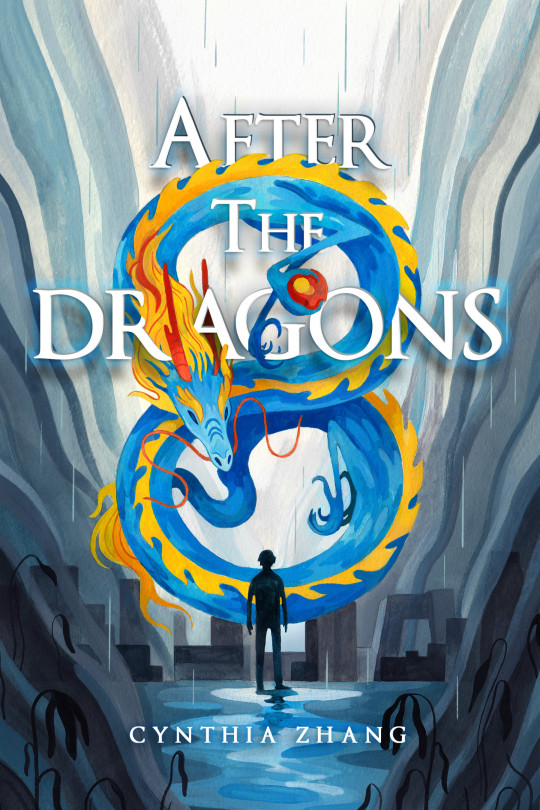
After the Dragons, Cynthia Zhang
(Stelliform Press 978-1-77709-174-3, $19.99 160pp, tp)
August 2021. Cover by Wang Xulin.
“Shaolong. Throat scorch. Caused by long exposure to poor air quality, especially common in cities with high pollution indexes and poor environmental regulations – the same disease that killed his grandmother.”
Cynthia Zhang’s After the Dragons is a queer SFF novella that follows Xiang Kaifei (Kai), a jaded college student, and Elijah Ahmed (Eli), an American medical researcher, as they search for a cure for shaolong, a terminal lung disease that ravages human populations. Perhaps they can even save the dragons, the former gods and revered beings of the East that now live like stray animals on the streets of Beijing. Focusing largely on climate change, the environment, and its impact on people and other earthly inhabitants, After the Dragons follows the Kai and Eli through science labs and street alleys as they tackle questions of a dying planet and their blossoming love for one another.
Beijing native Kai is terminally ill with shaolong and spends his days rescuing abandoned dragons in the streets. His caring yet stand-offish nature captures the attention of Chinese-American Eli, who is in Beijing to do immunological research before starting medical school and to learn more about the disease that killed his grandmother. Connected through this shared pain and tender kindness for the abused, forgotten dragons, their small yet meaningful attempts to make positive change are quite heroic, even if not filled with intense action scenes or brutal romantic heartbreak. They’re very sweet boys who have found one another through their shared caring for others. While it can be unclear exactly what attracted them to one another, aside from shared interests, it’s not of particular concern in the grand scheme of the story; they simply enjoy one another’s company and want to see one another survive.
Cynthia Zhang’s depictions of Beijing are built in part on Kai and Eli’s conversations about the differences between American cities and Chinese cities like Beijing. This happens quite often, despite their rigorous studies and Kai’s deteriorating health. It’s unclear why they are so fascinated with these constructed differences, and it seems more of an intrusion of the author’s interests than the characters. Yet they both appear to have wandering minds that direct the plot in various, unexpected directions. Kai and Eli are very much focused on their studies, and sorting out their place in a dying world rather than trying to change political systems and prevent planetary destruction. In a way, it makes the book less overwhelming, even if the stakes are still high. They’re average people, but just above-average enough to make an attempt at change a part of their life’s mission.
Due to the generous use of reflective inner dialogue, I found some passages a little too obvious, particularly as it related to Eli and Kai’s thoughts about imperialism, capitalism, and consumption. Not that their critiques of American cultural and moral imperialism and global consumption were unfounded, but they were written in an academic way rather than from the characters’ point of view, which removed me from the story and did not quite fit the rest of the novella’s tone. This wasn’t a fatal flaw, but it made it difficult to get into the story without losing my focus, and made it harder to understand the characters’ immediate, day to day aspirations.
Conversations between Kai and Eli become more relatable and less rehearsed as their relationship deepens and the physical space between them shrinks. It’s quite cute to see the pair grow increasingly comfortable around one another. I’m biased towards romance in SFF, so I can’t give an even and balanced take on whether this took off too quickly or not, I was just thrilled to see it happen.
There are many beautiful moments nestled in After the Dragons – like the subtle, two-sentence summaries that convey how the poor and the wealthy experience natural disasters amid slice-of-life depictions of Kai and Eli’s day to day life in the city. Kai’s walks through the city to search for dragons are a clever way to introduce readers to this fictional depiction of Beijing. The dragons flit in and out of the narrative like color splashes against the polluted city before taking on personalities of their own. Mei is a particularly well-written dragon, even if she has no dialogue – her personality is conveyed well enough that she is just as memorable, if not more so, than some of the human characters in the story.
It was very unusual to read a climate change novel devoid of a looming and sudden global extinction event – there were no large super storms or floods, just increasingly bad air, droughts, and sickness as a result. I quite enjoyed it, even with the slightly too-close-to-home feeling that much of this (dragons excluded) is already a reality for people….
2 notes
·
View notes
Text
ok so there's this queer brazilian writer who wrote a poem called Ivan that reminded me so much of destiel look look look (I'll translate it as best as I can)
"I don't know if for loving you
I love the whole world as well
or for being capable
of loving like that, the whole world
and for the impossibility of holding it
I hold in you the seven seas
the five continents
every race and language
sanskrit, tupi, armenian
the birth of Christ
the planetary system of Vega
archeologies, architectures
histories, geographies
everything we don't know
and what we know by heart
inch by inch, in your boy's body
my guiding light
justified life
soft mystery
love: this is your name
and I barely knew
of these vastness
kept like stars in our mouths when they meet."
Caio Fernando Abreu, 1983
original
"Não sei se por te amar
amo também o mundo inteiro
ou se por ser capaz
de amar assim, o mundo inteiro
e pela impossibilidade de abraçá-lo
abraço em ti os sete mares
os cinco continentes
todas as raças e linguagens
sânscrito, tupi, armênio
o nascimento de Cristo
o sistema planetário de Vega
arqueologias, arquiteturas
histórias, geografias
tudo que não conhecemos
e o que sabemos de cor
palmo a palmo, no teu corpo de menino
minha luz guia
vida justificada
manso mistério
amor: esse é teu nome
e eu mal sabia
dessas vastidões
guardadas feito estrelas em nossas bocas quando se encontram."
Caio Fernando Abreu, 1983
#supernatural#destiel core#destiel#deancas#cascore#literally the first verse#it's the confession are you seeing this shir#i love this writer so much please please please look into brazilian literature we got so much good stuff here
4 notes
·
View notes
Text
i know I’ve been working on my drag gods project, but i rlly wanna get back to my old queer space pirates novel idea. putting as much worldbuilding as i can under the cut about it bc i want to!!
like the main protag is an autistic trans man (who eventually becomes comfortable with presenting more gnc) that goes back to a destroyed earth (humans have already colonized parts of the Milky Way by then), which was abandoned because of climate change and an exchange of nukes, to research old human culture and how the environment is recovering.
what he finds there tho, is an agender alien (i know i know, it’s a stereotype), in a universe where aliens have NOT been confirmed to exist so it shouldn’t even be there, who somehow ended up there and lives alone on earth. they have no idea how they even got there in the first place, but they’d been living there for some time, and has tried to study what human culture was like bc they thought that humans were extinct, and immediately latches onto the protag. so the protag and his crew of misfit queers make it their mission to teach them about human culture and how to blend in with human society.
so now that he has an alien, the fascist government that has been searching for aliens for ages, eventually finds out and wants his crew imprisoned for hiding them, and wants the protag for his own personal reasons which I’ll get to in a bit. so the whole plot is them trying to evade government forces throughout the galaxy while trying to climb their way up the space pirate ladder, which is predominately full of crews of poor, queer rebels who are just truing to make it through life alive and are building their ranks of rebels to hopefully, one day be enough in numbers to overthrow the government. so they have to build an untraceable communication network to organize everyone under, which the protag’s whole crew and him are one of the crews tasked with establishing in the more ‘rural’ planets (like the ones on the outskirts of different solar systems). also, I’ll get to the main crew in another post, and the protag is named Ray btw
space fascist guy will be talked about in a character post, but there’s some small stand alone pieces in this universe that are about how all of this effects trans ppl in this. like this is hundreds of years into the future, right? u would think that transitioning is pretty much not a thing bc u could just get a custom robot body, right? nope. bc it’s astronomically expensive and only the ultra elite can afford them, therefore making them functionally immortal bc their brains are already downloaded into the next body. old school medical transitioning is so far out of affordability for about half of the population, the poor mostly, bc there’s no such thing as a middle class at this point, it’s all the poor and the ultra rich with no mid point. so the rebels, as a collective, use the space pirates to steal hormones and associated medical equipment for surgical transition to distribute to the people. even so, it’s still fairly hard to come by for most trans people.
there’s a small piece I wanna do about Ray, the protag, pretty much being raised by a collective of queer and trans punks along with their homemade robots (basically to be a friend and comfort to young queer ppl and to help them raise orphans). his mother tried to raise him, but she just couldn’t deal with her child being different AND her husband being the leader of their planetary rebellion therefore never being home AND him taking his son with him on non dangerous missions once in a while. Ray learns all about building things with scraps and rusty old stuff from the punks, and how to restore ancient (aka our current era of humanity) earth machines and also to become one hell of a haggler and how to cheat the government. idk I just thought it’d be a cute lil thing for his character and the general worldbuilding.
0 notes
Text
Futuristic Cinderella retelling: main characters

(approximations. Sadly I can't find a good picrew with mechanical wings 😞)
Phoenix Costello
they/them
Biromantic asexual, non-binary
21 years old
Has epilepsy
Cinderella role
Technician and engineer, with a pet robot. Has a sister somewhere, although they lost touch after Phoenix was disowned, and Phoenix misses her. Has an implant designed to help with their seizures, that has been malfunctioning since they started defaulting on the payments for its upkeep. Likes astronomy.
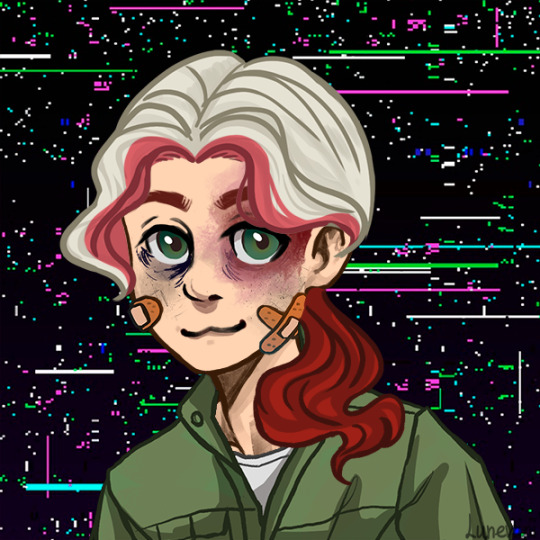
Santhiya Choudhary
she/her
Pansexual, cis woman
21 years old
Prince role
Princess, born into the role although her family hasn't always been royalty. Hindu and speaks a little [planetary system] Tamil, Sri Lankan family way back when they lived on earth (it's mostly just family legends now, although there is a cookbook). In a QPR with Brynn. Nicknamed Santh by Brynn and later Phoenix.
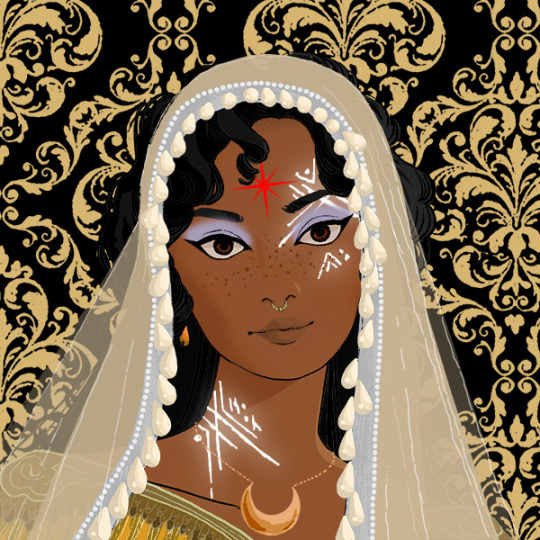
Kai Bergström
he/him
Cishet man
26 years old
Technician for the royal family. Spends a decent amount of time buying from Phoenix's shop, and is constantly covered in grime. Phoenix's best (and only) friend. Uses [planetary system] Swedish nicknames when people he loves are in distress.
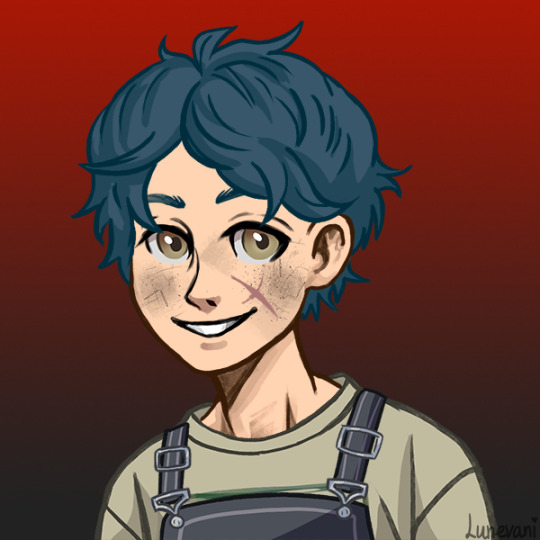
Brynn Carmichael
she/her
Aroace, trans woman
21 years old
Has a stutter and anxiety
In a QPR with Santhiya, and has been her best friend since they were children. She lives in the palace and has a bird called Horus. Works in the palace aviary.
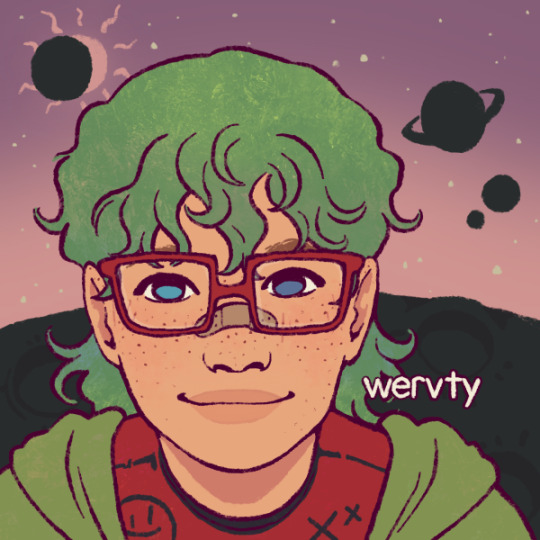
Aaron Thomas
he/they
Gay asexual, trans man
35 years old
Fairy godmother role
Part-time fairy godfather and medic. Works too hard and has to be pushed into taking time off. His wings are made from Phoenix's blueprint. Incredibly oblivious when someone's fallen in love with him.
Morfydd Llewellyn
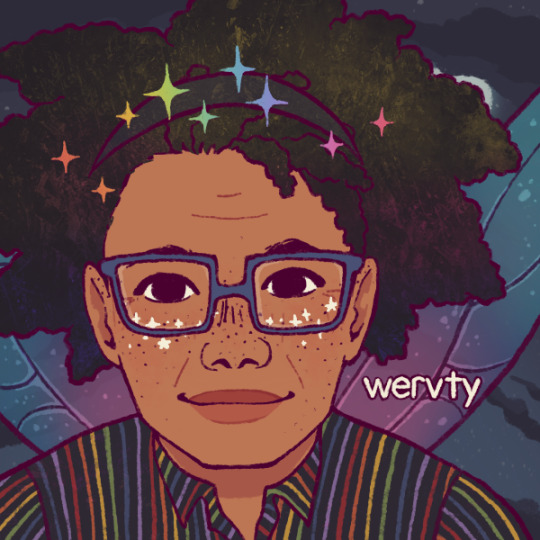
they/them
Queer, demigirl
33 years old
Ambulatory wheelchair user, easily overstimulated
Fairy godmother role
Fairy godmother. Their wings are made from Phoenix's blueprint. Enjoys helping people, although they have to wear ear defenders to do so as they get overstimulated easily (which causes migraines and breakdowns and all that fun stuff). Speaks Archaic Welsh without realising it when she's distressed or angry.
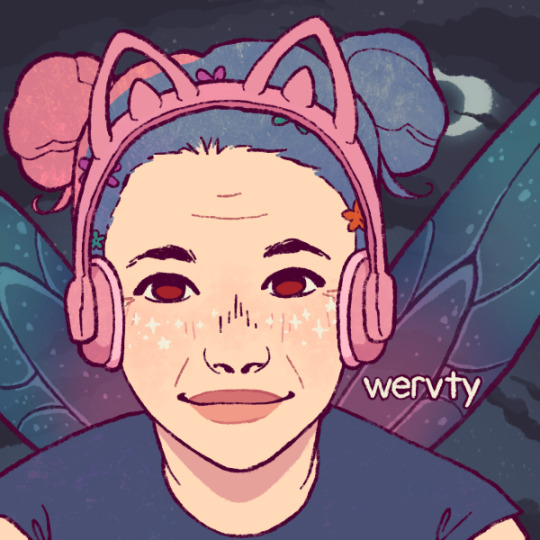
Abbie Graham
she/her
Cishet woman
27 years old
Evil stepmother role
Manages the shop where she, Indigo, Segun, and Phoenix work. Abusive towards Phoenix, physically, verbally and mentally (though Phoenix's parents certainly set the stage mentally). Rich, this job is just a hobby for them. Big fan of fashion.

Indigo Bron
she/they
Queer
29 years old
Dyslexic
Evil stepsister role
Technician and engineer, she works with Phoenix on new designs. She has a very bad relationship with her family (especially her dad) and honestly, some of the jabs Abbie makes about Phoenix's family are going way too far. On the verge of leaving tbh. But they don't exactly feel sorry for Phoenix, or help them deliberately (they're abusive themself, at times), the comments are just... poking at a sore spot.
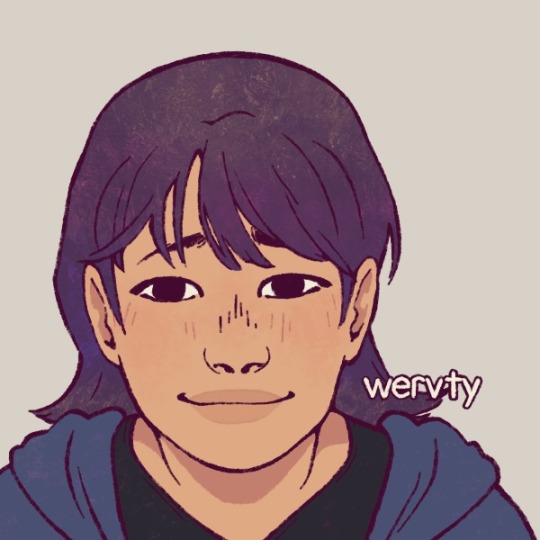
Segun Adu
he/him
Cishet man
25 years old
Evil stepsister role
Works in the machine shop, testing the new builds. Mainly stress-testing for designs that need it. Enjoys doing this, and partaking in and watching shuttle racing. Likes getting Phoenix to do menial jobs for him, and getting them into accidents. Pretty abusive, and although he follows Abbie's lead he'd definitely abuse them on his own anyway.

#cinderella au#phoenix costello#santhiya choudhary#kai bergstrom#brynn carmichael#aaron thomas#morfydd llewellyn#abbie graham#indigo bron#segun adu
0 notes
Text
Trans, Asexual, Aromantic




#trans#asexual#aromantic#transgender#aro#aroace#aspec#arospec#pride flag planets#queer planetary system#pride flag#subtle pride#lgbtq+#queer#pride#lgbt#lgbtq#ace
24 notes
·
View notes
Text
Universal Love for What the Universe Has to Offer
welcome to celestial bodies otd...where i post space things of varying origin when i want to :)
(only) admin @anbellstudio
follow our account on twitter, too!
anti-space conspirists dni PLEASE!!!
main info - here!
submissions - here!
more info under the cut ...
This is an account dedicated to showing off and telling facts about various celestial bodies I found (or was submitted by others,) regardless of possible obscurity. As long as it comes from space, it'll be shown here :)
Celestial bodies are basically anything that is both made naturally and exists in the observable universe, which is stuff like planets and stars.
The term celestial object(s) can refer to these as well, but are usually used for things like planetary systems and star clusters, which I may show alongside this.
This is also a general space appreciation account because I love space one of my favorite things of all time !!! i have a silly creation dedicated to it. it's called space buddies...Reposts from other things under space-related tags are likely too because of space liking. I like saturn
i am generally a gay planet (or celestial body) believer any planet that crosses my eyes is one of them queers in one way or another.also a shipper of them. i like gliesaturn
anything that isn't an otd post will be tagged //nonspacial otd, and space buddies content will be tagged //space buddies content. planetshipping shenanigans will be tagged as the shipname. if you would not like to see content from these tags, please block them
you can submit celestial bodies for me to show through these method
through the google form (over here!!!) for posts that you'd like to be an otd post only.
through the built in tumblr ask feature for general space facts/images/hcs you'd like to say. nothing sent through here will be counted as an otd post, please be weary of this
anyways that's basically it lol. follow and tell your friends if you want,
#pinned intro#pinned info#space#outer space#tag dump from here on -->#//nonspacial otd#//gliesaturn#//space buddies content#//blacktune#[mercury]#[venus]#[earth]#[mars]#[jupiter]#[saturn <3]#[uranus]#[neptune]#[the sun]#[gliese (504 b)]#[(51) eridani (b)]#[black hole(s)]#[exoplanets]#[stars]#[other celestial bodies]
1 note
·
View note
Note
what are all the podcasts you listen to?
anon I'm so glad you asked
Since it is a pretty long list including synopses (stolen from the podcast feed or website because I'm Bad at summaries and in some cases it's been a while since I listened) I'm going to put it under a cut.
I've separated the list into "Complete" (either finished or cancelled) and "Ongoing" podcasts. Some have additional comments by me. Current favorites are marked orange. My eternal beloved are Our Fair City and Wolf 359.
Complete
ars PARADOXICA: "When an experiment in a time much like our own goes horribly awry, Dr. Sally Grissom finds herself stranded in the past and entrenched in the activities of a clandestine branch of the US government. Grissom and her team quickly learn that there's no safety net when toying with the fundamental logic of the universe."
Blackwood: "Five years ago, Molly Weaver, Bryan Anderson, and Nathan Howell started a podcast focused on the local legend of a monster called The Blackwood Bugman. Quickly, the investigation grew out of their control, as they discovered that, not only are the legends seemingly true, many people in Blackwood have turned up dead or disappeared without a trace."
--> [this feels like the Blair With Project, but as a podcast. Didn't get a second season due to no funding, but it works as a standalone]
Dreamboy: "Dane, a spun-out musician spending the winter in Cleveland, Ohio, has two main goals: keeping his job at the Pepper Heights Zoo and trying not to waste all his time on Grindr. What he doesn’t expect is to get swept into a story about dreams, about forevers, about flickering lights, about unexplained deaths, about relentless change, and about the parts of ourselves that we wish other people knew to look for. Oh, and also a murderous zebra."
--> [very NSFW; does cool things with music! Didn't get a second season due to no funding, but it works as a standalone]
King Fall AM: "...centers on a lonely little mountain town's late-night AM talk radio show and its paranormal, peculiar happenings and inhabitants."
--> [cancelled after 100 episodes, ends on a huge cliffhanger]
Our Fair City: "A campy, post-apocalyptic audio drama."
--> [I know the description sounds like nothing but just trust me, I love it so much]
Steal the Stars: "...is a gripping noir science fiction thriller in 14 episodes: Forbidden love, a crashed UFO, an alien body, and an impossible heist unlike any ever attempted."
Stellar Firma: "...a weekly Science Fiction, Comedy podcast following the misadventures of Stellar Firma Ltd.'s highest born but lowest achieving planetary designer Trexel Geistman and his bewildered clone assistant David 7. Join them each episode as they attempt to take listener submissions and craft them into the galaxy's most luxurious, most expensive and most questionably designed bespoke planets. However, with Trexel's corporate shark of a line manager Hartro Piltz breathing down their necks and I.M.O.G.E.N., the station's omnipresent and omniinvasive stationwide A.I. monitoring those necks to within 3 decimal places, they'll be lucky to make it a week before being slurried and recycled into raw human resources."
--> [semi-improvised, I thought I'd have a problem with the improv bit because that's not usually my thing, but no, I absolutely devoured this]
TANIS: "...is a serialized docudrama about a fascinating and surprising mystery: the myth of Tanis. Tanis is an exploration of the nature of truth, conspiracy, and information. Tanis is what happens when the lines of science and fiction start to blur." [+ spinoff The Last Movie]
--> [I have no clue what the hell is going on here]
The Black Tapes: "...is a serialized docudrama about one journalist's searc for truth, her enigmatic subject's mysterious past, and the literal and figurative ghosts that haunt them both."
The Magnus Archives: "...is a weekly horror fiction anthology podcast examining what lurks in the archives of the Magnus Institute, an organisation dedicated to researching the esoteric and the weird. Join new head archivist Jonathan Sims as he attempts to bring a seemingly neglected collection of supernatural statements up to date, converting them to audio and supplementing them with follow-up work from his small but dedicated team. Individually, they are unsettling. Together they begin to form a picture that is truly horrifying because as they look into the depths of the archives, something starts to look back…"
Time:Bombs: "...a new audio drama podcast about the hilarious world of bomb disposal. Ride along with EOD technician Simon Teller on the busiest night of the year for him and his team - when business is, quite literally, booming."
Wolf 359: "Life's not easy for Doug Eiffel, the communications officer for the U.S.S. Hephaestus Research Station, currently on Day 448 of its orbit around red dwarf star Wolf 359. He's stuck on a scientific survey mission of indeterminate length, 7.8 light years from Earth. His only company on board the station are stern mission chief Minkowski, insane science officer Hilbert, and Hephaestus Station's sentient, often malfunctioning operating system Hera. He doesn't have much to do for his job other than monitoring static and intercepting the occasional decades-old radio broadcast from Earth, so he spends most of his time creating extensive audio logs about the ordinary, day-to-day happenings within the station. But the Hephaestus is an odd place, and life in extremely isolated, zero gravity conditions has a way of doing funny things to people's minds. Even the simplest of tasks can turn into a gargantuan struggle, and the most ordinary-seeming things have a way of turning into anything but that."
--> [starts funny, turns very intense]
Ongoing
Alba Salix, Roya Physician (+ The Axe & Crown): "A witch, her apprentice, and her fairy herbalist treat the ills of a fairy-tale kingdom." + "Gubbin the troll tavernkeeper deals with his clueless new landlord, his shady niece, and some new competition."
Archive 81: "A found footage horror podcast about ritual, stories, and sound."
Arden: "A (fictional) true crime podcast about cold cases and the reporter and detective who try to solve them."
Brimstone Valley Mall: "The year is 1999. Lurking somewhere between Hot Topic and the food court, five misfit demons from Hell kill time inciting sin in a suburban shopping mall. When the lead singer of their band goes mysteriously missing, the demons only have two weeks to find him before they play the biggest gig of the millennium - or face the wrath of Satan herself."
CARAVAN: "First rule of Wound Canyon: No one who gets in, ever gets out. So when a brilliant, ghostly specter flies through the sky amid the rain and lightning, Samir stumbles off a steep cliff and into a hidden world, one in which demons, vampires, and all other manner of paranormal creatures take sanctuary."
--> [also pretty NSFW and horny in general]
Death by Dying: "The Obituary Writer of Crestfall, Idaho finds himself deeply in over his head as he investigates a series of strange and mysterious deaths… when he is supposed to simply be writing obituaries. Along the way he encounters murderous farmers, man-eating cats, haunted bicycles, and a healthy dose of ominous shadows."
--> [I had to stop listening to this in public because it kept making me undignified laugh and snort noises]
Desperado: "Blood magic, Voodoo magic, old gods, new gods: We've got it all! Follow the story of misfits from all over the world, as they try to survive and protect their heritage from modern-day crusaders."
EOS 10: "Doctors in space, a deposed alien prince, a super gay space pirate and a fiery nurse who'll help you win your bar fight."
Girl In Space: "Abandoned on a dying ship in the farthest reaches of known space, a young scientist fights for survival (and patience with the on-board A.I.). Who is she? No one knows. But a lot of dangerous entities really want to find out. Listen as the story unfolds for science, guns, trust, anti-matter, truth, beauty, inner turmoil, and delicious cheeses. It’s all here. In space."
Janus Descending: "...follows the arrival of two xenoarcheologists on a small world orbiting a binary star. But what starts off as an expedition to survey the planet and the remains of a lost alien civilization, turns into a monstrous game of cat and mouse, as the two scientists are left to face the creatures that killed the planet in the first place. Told from two alternating perspectives, Janus Descending is an experience of crossing timelines, as one character describes the nightmare from end to beginning, and the other, from beginning to the end."
--> [absolutely harrowing horror]
Love and Luck: "...is a fictional radio play podcast, told via voicemails and set in present day Melbourne, Australia. A slice of life queer romance story with a touch of magic, it follows the relationship between two men, Jason and Kane, as their love grows both for each other and their community."
--> [soft and gay, feels like a warm hug]
Potterless: "Join Mike Schubert, a grown man reading the Harry Potter series for the first time, as he sits down with HP fanatics to poke fun at plot holes, make painfully incorrect predictions, and bask in the sassiness of the characters."
--> [the only non-fiction podcast on the list]
Primordial Deep: "When a long extinct sea creature washes up on the shores of Coney Island, marine biologist Dr. Marella Morgan is contacted by a secret organization to investigate the origins of the creature’s sudden and unnatural resurgence. Soon, she and a team of experts find themselves living on the research station The Tiamat, traveling along the abyssal plains as they search for answers far below the waves. But there are dangers in these ancient waters. Reawakened, prehistoric monsters are rising from the deep -- jaws wide and waiting, and in the darkness, something is stirring."
Red Valley: "No one at Overhead Industries wants to talk about defunct research station Red Valley, and account man Warren Godby is out of his depth. When he meets Gordon Porlock, a disgruntled archivist with a bag of tapes from the station’s last known occupant, they will begin a journey to the limits of experimental science, confront horror and trauma from the past, present and future, and try to remember the cheat codes from Sonic the Hedgehog 2."
Rusty Quill Gaming: "An actual play podcast following a mixed ability group of comedians, improvisers, gamers, and writers as they play through the extended, tabletop roleplaying campaign Erasing the Line, an original game world of the GM’s crafting."
--> [took me a while to get into because I have trouble focusing on non-scripted things, but eventually I got really hooked on the plot and attached to the characters. This podcast is really fucked up at times if you think about it]
SAYER: "A narrative fiction podcast set on Earth’s man-made second moon, Typhon. The eponymous SAYER is a highly advanced, self-aware AI created to help acclimate new residents to their new lives, and their new employment with Ærolith Dynamics."
--> [feels like Welcome to Night Vale but narrated by GLaDOS from Portal]
StarTripper!!: "Join Feston Pyxis on a road-trip through the cosmos, as he leaves behind his old life in search of the best and wildest experiences the galaxy has to offer!"
The Amelia Project: "...is a secret agency that fakes its clients' deaths, then lets them reappear with a brand new identity! A black comedy full of secrets, twists... and cocoa."
The Big Loop: "...a biweekly anthology series. Each episode is a self-contained narrative exploring the strange, the wonderful, the terrifying, and the heartbreaking. Stories of finite beings in an infinite universe."
--> [I don't like anthologies, except this one]
The Bright Sessions: "Dr. Bright provides therapy for the strange and unusual; their sessions have been recorded for research purposes."
--> [think X-Men, but with therapy instead of a school]
The Deca Tapes: "Recordings have surfaced of ten people that are locked into the same space together. We don’t know where they are, or if they'll get out. But the answers must be somewhere on these tapes."
The Silt Verses: "Carpenter and Faulkner, two worshippers of an outlawed god, travel up the length of their deity’s great black river, searching for holy revelations. As their pilgrimage lengthens and the river’s mysteries deepen, the two acolytes find themselves under threat from a police manhunt, but also come into conflict with the weirder gods that have flourished in these forgotten rural territories."
The White Vault: "Follow the collected records of a repair team sent to Outpost Fristed in the vast white wastes of Svalbard and unravel what lies waiting in the ice below."
Tides: "...is the story of Dr. Winifred Eurus, a xenobiologist trapped on an unfamiliar planet with hostile tidal forces. She must use her wits, sarcasm and intellectual curiosity to survive long enough to be rescued. But there might be more to life on this planet than she expected."
--> [think The Martian, but on a water planet]
Unwell, a Midwestern Gothic Mystery: "Lillian Harper moves to the small town of Mt. Absalom, Ohio, to care for her estranged mother Dorothy after an injury. Living in the town's boarding house which has been run by her family for generations, she discovers conspiracies, ghosts, and a new family in the house's strange assortment of residents."
VAST Horizon: "Nolira is an agronomist tasked with establishing agriculture in a new solar system, but when she wakes up on a now- empty colony ship, the whole of her plan disappears. The ship has been set adrift, with numerous mission-critical problems requiring immediate attendance outside of her area of expertise. Nolira is aided by the ship’s malfunctioning AI, which acts as her confidant and companion during the fight for survival."
Victoriocity: "Even Greater London, 1887. In this vast metropolis, Inspector Archibald Fleet and journalist Clara Entwhistle investigate a murder, only to find themselves at the centre of a conspiracy of impossible proportions."
We Fix Space Junk: "...follows seasoned smuggler Kilner and reluctant fugitive Samantha as they travel the galaxy, dodging bullets and meeting strange and wonderful beings as they carry out odd jobs on the fringes of the law."
Welcome to Night Vale: "Twice-monthly community updates for the small desert town of Night Vale, where every conspiracy theory is true. Turn on your radio and hide."
Within the Wires: "Stories told through found audio from an alternate universe."
Wooden Overcoats: "Rudyard Funn and his equally miserable sister Antigone run their family's failing funeral parlour, where they get the body in the coffin in the ground on time. But one day they find everyone enjoying themselves at the funerals of a new competitor - the impossibly perfect Eric Chapman! With their dogsbody Georgie, and a mouse called Madeleine, the Funns are taking drastic steps to stay in the business…"
--> [one of THE funniest podcasts I have ever listened to]
41 notes
·
View notes
Text
FANGED PLANETARY SYSTEM
collective pronouns: they/it || traumagenic DID || fictive heavy autistic system || bodily 19 || queer || physically disabled mobility aid user || use we/us and i/me interchangeablly || this is a side blog so we can't follow back
icon/graphics blog: @miraculous-icons
DNI/BFYI
alter intros
6 notes
·
View notes
Text
lesbian monarchism
I had a throwaway detail in some worldbuilding: "X lives in a planetary culture where being a lesbian is moderately stigmatized because it's associated with the semi-fringe monarchist movement". Here’s how I think that works.
Challism is the ideology that the best form of interplanetary governance is hierarchied polities dealing with each other fairly and mercifully, based on personal ties between strongly surveilled monarchs who are women screened for empathy as well as competence. These monarchs hold power for up to a lifetime by default, but can be voted out. They should primarily have social and emotional and sexual bonds with each other, and limit the role of men in power because men tend to be too ambitious and mess up the cooperate/compete equilibrium that's set closer to cooperate if women are in charge. Challists state that they are not suspicious of men in general, only the kinds of men who tend to gravitate towards the top in a natural political environment. They think the average woman and the average man aren’t that different in ambition or ruthlessness, but the 99.9th-percentile-ambitious man is much worse than the 99.9th-percentile-ambitious woman.
The founder, Chall, established the movement through erotic literature – she wrote a lot of lesbian porn espousing this very system of royalty, with lots of ideological expositions. She was influential in the same kind of way Ayn Rand was. The typical radicalization pathway is that a relatively intellectual teenage girl will read this weird 100 year old gay porn novel for kicks (like reading de Sade today), get sucked in, and have their gay awakening at the same time they come into political consciousness. Chall is hot and charismatic and paints a picture of a lesbian power structure utopia that's candy for a certain kind of ambitious gay woman. Chall points towards a handful of space age states that had unusually good governance and economies under the lead of women who had social ties to each other and argues for further emulation, although the evidence that this is particularly helpful is ambiguous. Challism stays in vogue by having just enough functional institutions run by charismatic people.
There is something that looks like lesbian-specific homophobia in this world but the central example of it is "you're gay? are you a power hungry monarchist?". Sufficiently many high profile women answer "yes I'm proud of it" or "no but I endorse lesbian monarchy and my ideal place in that system is as a high status sub who's pampered by the high-powered monarchs", that the lesbians who aren't monarchists have a moderately annoying time dating.
(I cannot overstate how much I wrote this because imagining very different cultural contexts for queerness delights me, and how little I care about real life discourse. This is meant to be a relatively minor detail in a story where the focus is on my two gay female leads destroying or trying to destroy each other's lives, becoming obsessed with each other, and fucking while playing stupidly elaborate mind games.)
237 notes
·
View notes
Text
Winter’s Orbit - Everina Maxwell
B- : an A+ romance but I would have loved to see a single subplot.
Prince Kiem is a charismatic, irresponsible junior member of the royal family of Iskat, a small Empire spanning a few planetary systems. When his grandmother the Emperor orders him to marry the Jainan, the widower of his dead cousin, he and Jainan get mixed up in a planetary conspiracy.
This is only the second or third romance book I’ve ever read, so I don’t know if it’s common in romance for the main characters to be fleshed out and for everything else to kind of revolve around it.
I thought the love story was beautifully done, but Maxwell has created this whole empire and started talking a lot about fantasy politics - I kind of wish the story had expanded to include more of the world it’s set in, and given some of its side characters their own arcs.
But, like. Kiem and Jainan? Fantastic characters. They’re such charming protagonists - I was emotionally attached to them both before I was 25 pages in.
Maxwell manages to give us will-they-won’t-they suspense without ever crossing the line into too much or annoying. It’s genuinely a joy to watch the two of them interact, and this is the first instance of miscommunication stopping a couple from being together I’ve seen where I didn’t get frustrated a few pages in.
I’ve heard people advertise this as ‘it reads like fanfiction’ and I can understand why - it’s compulsively easy to read, relies more on character dynamics than the ticking clock most SFF stories have, and isn’t afraid to have scenes that are just meant to be enjoyable to read and don’t advance the plot.
Also, it had my favourite trope of ‘simulation to take you through your own memories’! I love that trope.
Plot: not much of it, to be honest. Character-focused stories are great, but I do wish that even if we didn’t go deep into the galactic politics like I wanted, we’d at least learn about the best friend Bel, who seemed there to be a plot device.
Characters: peak. Like I said, Jainan and Kiem are perfect and the development of their relationship is perfect, as well. Like. The Left-Hand-of-Darkness-style scene in the tent? Jainan gradually coming to trust Kiem while Kiem is head-over-heels immediately but still respects Jainan’s boundaries? Peak. There wasn’t a single character trait on a side character, though.
Setting: would have loved to see more of this. I’m especially interested in the different cultures between main society of Iskat, featuring dinosaurs in a winter setting, and Jainan’s planet, Thea, which operates on a complex clan system I’d loved to have dived into. I’ve heard Maxwell is planning another book set in the same universe - I’d be excited to read that.
Prose: fine. There were some great one-liners from Kiem, which I can appreciate.
Diversity rating: everyone is Space Race (you know, non-white and ethnically ambiguous living in a post-racial society), a mlm couple, casual queer representation (including nonbinary representation).
#winter's orbit#everina maxwell#badbookopinions#mlm couple#casual queer rep#high romance#space opera#adult fiction
5 notes
·
View notes
Text
Rebooting My Practice
This is going to be pretty rambly, but I always get a lot out of these posts when other people make them so I wanted to make one too.
I hit a point earlier this year, as I started to really see what all astrology could be, when I knew I was going to need to overhaul pretty much my entire practice. For the last decade, I've focused on divination; on doing activities that sharpen my intuition, following up and checking predictions, tracking cards and results to better understand the connection, etc. I did this primarily in the service of my main deity, the Morrigan.
I still work with her, but I'm in a lurch as to how to continue my work with her. I have yet to quite figure out how to balance her general distaste for shrines (with me at least) and deepening my relationship with her in the absence of local folks to read for as I've relied on for years (thanks COVID). I've been praying the Catholic Rosary lately as a way to deepen my relationship with the Virgin Mary and the Saint I'm petitioning lately and I feel her kind of peering in when I do that so I might have to design one for her. I have a feeling whatever I come up with will likely be in a free zine rather than a blog post at some point.
But where that left me was in this weird abyss, where the only really solid things in my practice were like 3 deities (The Morrigan, Hermes, Yinepu/Anubis) I worked with regularly and tarot cards. I think for plenty of people that's fine but I wanted something deeper and more effective. It was around the time that I was rethinking everything that I stumbled on to this post about a magical routine that absolutely enthralled me. It took me another month and ultimately moving house altogether to even begin to piece something together that would set me on the road to something like this. I knew I was not ready but I finally had a picture in my mind something to work towards. Like rehabilitating after an injury, sometimes you've got to do half as much as you think you can before you really take off.
So I wanted to take some time and talk about the way my practice is changing and what the new pillars are slowly emerging to be.
Planetary Petitions
While I don't have the Orphic Hymns for each of the 7 classical planets memorized yet as per the post, I started by doing planetary prayers more days than I do not do them. Thanks to my truly godawful downstairs neighbor at the new place, who's floor shaking door slams throughout the whole night have netted me an average of 3 hours a night, I'm usually up for the first planetary hour of a given day. Hey maybe it's a sign, a big universal push to show the fuck up.
I'm also incredibly lucky I loaded up on some planetary incenses right before COVID when a local store had a huge sale. It's proved well worth it as above all I try to get the planetary incense right, though I did have to default to a Frankincense one when we were first moving in. I slowly feel like I'm beginning to understand the planetary spirits better but only slightly. I completely see why memorizing the prayer is recommended and I do feel that's standing in the way of me being closer with them.
I have not noticed a huge difference when I petition them truthfully. I get the vibe that it takes time to build up that relationship. Though I'm open to input here - for those who do planetary petitions, what made them click for you?
Saint Veneration + Christian Magic
One thing I put off for many years, though I knew it was coming, was working with more Saints. I knew it'd likely involve having to dip back into Christianity to make it work and I was completely right.
As my partner began revisiting her Catholic roots earlier this year, it got me curious about things like the Rosary, the Chaplet, and Novenas. I was raised charismatic fundamentalist Christian as a child and such things were explicitly forbidden. I remember getting a long talking to when I'd taken to reading about Sainte Jeanne d'Arc. So they aren't loaded for me the way they are for others, but they’re situated in this fundamentally familiar context that makes them feel like meeting a cool branch of the family you didn't realize existed.
I'm finishing a Novena to a Saint I've been praying to in the next few weeks. I am admittedly not as close with her as I'd like to be. I'm trying to figure out how to move forward with her as I'd really like to have her in my life. I will probably reach back out to Sainte Jeanne d'Arc as she's always felt familiar and been good to me. I also keep her prayer card and medallion in my wallet and have for many years so maybe there's more to build from there. It is my goal to have about 3 saints/Christian figures I can call on when I need help. I'm thinking of approaching Mary Undoer of Knots next but I'm worried it'll follow the same path as this current saint.
My partner and I bought Rosaries back in May and I absolutely love it. I've been saying at least a 5 decade rosary for most days but I'm regularly getting in a 15 decade rosary. I really love it and am totally convinced of the beauty and effectiveness of the system. I've come to understand Christianity in a totally different light through praying it regularly.
So that is on going and evolving and I'd love to hear from people who've cultivated close relationships with a Saint or Angel.
Ancestors
One thing that working with Christianity again has made easier is praying to ancestors. I've often felt a bit at odds with my own ancestors as they were not the most supportive of trans and queer people (and I am both of those) but in coming back to Christianity has given me and my ancestors a common language almost. As long as my disagreement with them over my attraction and gender identity is rooted in the Bible, it's been easier to work with them.
It's very early days with ancestor work. I'm slowly working my way through Ancestral Healing by Daniel Foor. But I'm feeling very heartened by it. I saw a post on twitter somewhere, if I can find it again I'll link it, where someone said that the way they started working with their ancestors was just thanking them everyday. And thanking my ancestors is complicated for me, my family like most have their own issues that also go passed on, but thanking them for what I am glad they gave me has been really beneficial.
My partner requested some divination from me when some of her medical issues were starting to get worse and part of the reading involved a strong push for her to investigate her father's side of the family. She got really into genealogy in the process and she's been teaching me a lot. Through that I actually learned my great grandfather's name for the first time - yes that's how out of touch I am with my own family history. But I was thankful to find out.
Through her own research, my partner found out that that branch of her family likely isn't German but actually German speaking Hungarians which was a revelation. She's in the process of confirming but it got us talking about foods and identity and language and how to honor our ancestors more regularly. We're going to try making a nice dinner on Full Moons with dishes that are tied to branches of our family as a way to trying to cultivate a closer relationship with them. I'll definitely update on that as it evolves.
Conclusion + Some Thoughts on Disability
I'm definitely still in the early days of all of this. It's not become quite the foundation I hope it will be yet. I still need to figure out how to continue and deepen my deity relationships. I still need to attempt some different types of spellwork I've been meaning to. And while I didn't talk about it much here, astrology has been playing a huge role in my practice but mostly in a passive way. More of that divination process I talked about in the beginning where I make predictions based on the charts I'm seeing and then double check my work.
I’ve been doing all this while in the thick of a bad flare. Moving plus lack of sleep as meant my disability has been weighing so much harder on me lately. Normally when I’m feeling well enough, I kind of roll my eyes at a lot of the “spoonie witchcraft” posts I see, but for some reason with this flare they just started making me angry and I’m still trying to parse why. I think I just feel like so many are rooted in this performative idea of “feeling” witchy rather than actually helping me with my disability. They aren’t usually focused on practices that either actually treat the pain I’m in or bring my spirit real comfort.
I’m really hoping to put together a post or possibly a zine that does provide what I always wanted those posts to be. Honestly these pillars here have proven accessible even as I’ve been in some of the worst pain I’ve been in in years. So for any fellow disabled folks who just aren’t getting much out of those posts, I really recommend starting with these. Recite the Orphic Hymn for the day in the corresponding hour. Pray the Rosary or an adapted set of prayers for Pagan prayer beads. Don’t have much money for those? Look up how to make knotted rosaries and adapt the method. Pray to your ancestors and give them some water and a bit to eat. These are doable for a lot of folks even when they’re in bad shape, especially if you take your time with it. Might not make you “feel witchy” but they do some fucking work, that’s for sure. But idk, those are just my thoughts on it.
So it hasn't all fallen into place yet but I wanted to share what developing a practice looks like in medias res. It's messy, somethings work better than others, but all and all I'm just glad to finally be making meaningful progress again.
31 notes
·
View notes